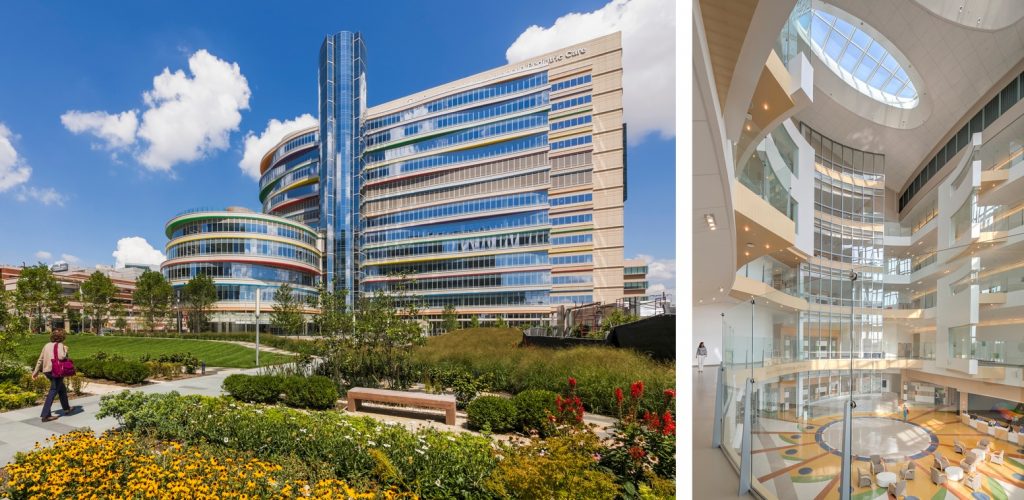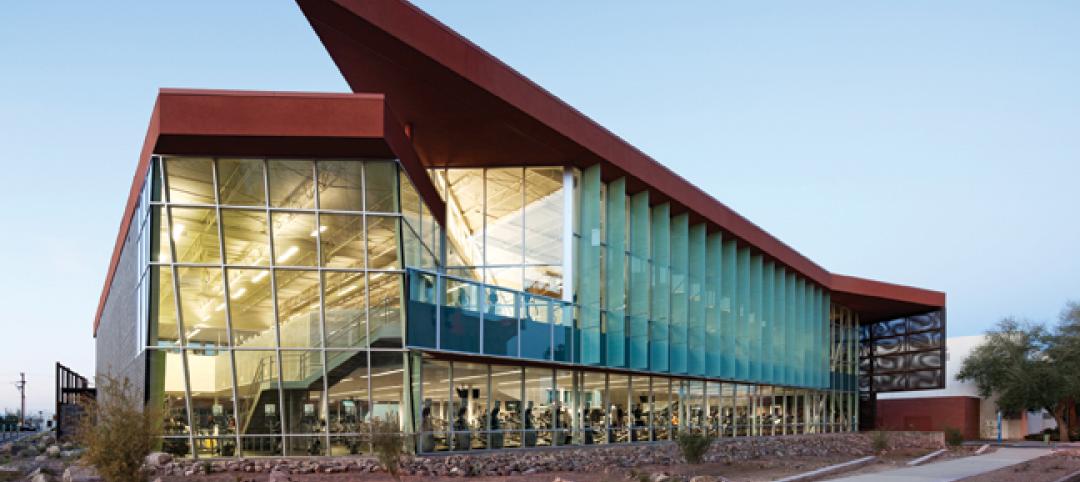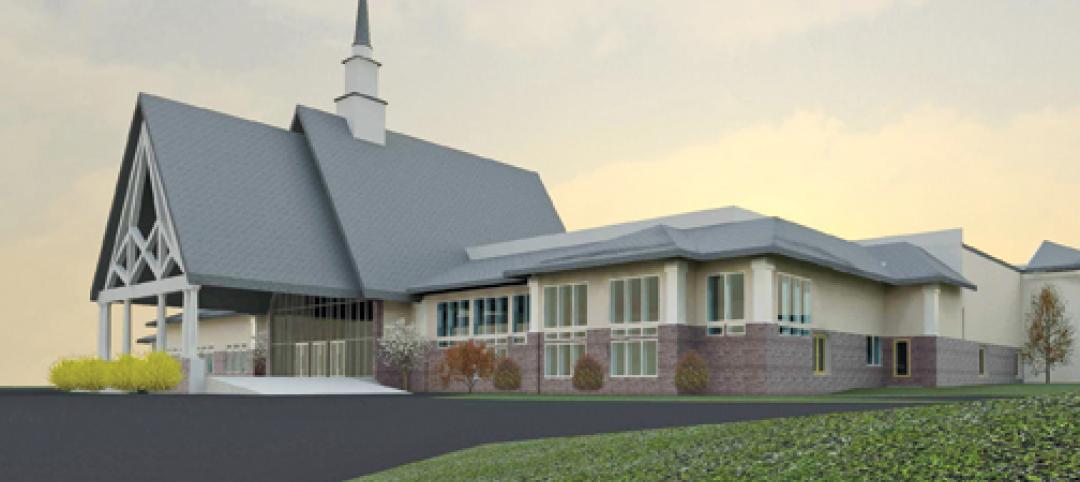In a deal announced this morning, Houston-based healthcare and S+T design specialist FKP has merged with design giant CannonDesign (#8 on BD+C’s Giants 300 Top 100 Architecture/Engineering Firms ranking). The merger forms a 19-office, 960-employee practice that produced more than $220 million in combined design revenue in 2016.
Led by CEO Diane R.K. Osan, FAIA, ACHA, FKP is an internationally recognized design firm with offices in Houston, Dallas, and Columbus. Known for its expertise in pediatric healthcare, the firm has designed children’s facilities throughout the U.S., including Nemours’ A.I. DuPont Hospital for Children in Wilmington, Del., the Children’s Hospital of Philadelphia’s Buerger Center for Advanced Pediatric Care in Philadelphia, and numerous projects for Texas Children’s Hospital.
“CannonDesign’s five-year strategic framework focuses on proactive strategies for strengthening our client partnerships through personal and firm growth by office expansions, new hires, and mergers,” said CannonDesign’s CEO Brad Lukanic, AIA, in a statement. “Today’s merger with FKP intentionally increases CannonDesign’s commitment to total health solutions with a focus on children’s health, while advancing our design impact, being a top-tier employer, and taking a stronghold in key geographic areas like Texas and Ohio.”
Reflecting on the shared benefits of the merger, Osan notes the opportunity to profoundly impact community health. “In order to effectively improve the conditions of our communities, we have to start by addressing the needs of children. Not just healthcare for children, but education, research, recreation, nutrition and that list goes on. All of these factors are critical in setting the path for a child’s future, and our firms’ combined expertise will allow us to address these factors and set children and communities up for success.”
Osan will assume the role as leader of CannonDesign’s Pediatric Health Practice. Looking beyond the traditional definition of healthcare, she will lead the practice in exploring ways to support the health and wellbeing of children across numerous environmental settings. She’ll also be joining the firm’s board of directors.
“Both of our firms have solid foundations,” added Lukanic. “Now we can expand in key areas to further serve our clients and create partnerships to evolve our design practice.”
Going forward, FKP will conduct business as FKP | CannonDesign.
Related Stories
| Nov 9, 2010
Designing a library? Don’t focus on books
How do you design a library when print books are no longer its core business? Turn them into massive study halls. That’s what designers did at the University of Amsterdam, where they transformed the existing 27,000-sf library into a study center—without any visible books. About 2,000 students visit the facility daily and encounter workspaces instead of stacks.
| Nov 9, 2010
Turner Construction report: Green buildings still on the agenda
Green buildings continue to be on the agenda for real estate owners, developers, and corporate owner-occupants, according to the Turner 2010 Green Building Market Barometer. Key findings: Almost 90% of respondents said it was extremely or very likely they would incorporate energy-efficiency improvements in their new construction or renovation project, and 60% expected to incorporate improvements to water efficiency, indoor environmental quality, and green materials.
| Nov 5, 2010
New Millennium’s Gary Heasley on BIM, LEED, and the nonresidential market
Gary Heasley, president of New Millennium Building Systems, Fort Wayne, Ind., and EVP of its parent company, Steel Dynamics, Inc., tells BD+C’s Robert Cassidy about the Steel Joist Manufacturer’s westward expansion, its push to create BIM tools for its products, LEED, and the outlook for the nonresidential construction market.
| Nov 3, 2010
First of three green labs opens at Iowa State University
Designed by ZGF Architects, in association with OPN Architects, the Biorenewable Research Laboratory on the Ames campus of Iowa State University is the first of three projects completed as part of the school’s Biorenewables Complex. The 71,800-sf LEED Gold project is one of three wings that will make up the 210,000-sf complex.
| Nov 3, 2010
Park’s green education center a lesson in sustainability
The new Cantigny Outdoor Education Center, located within the 500-acre Cantigny Park in Wheaton, Ill., earned LEED Silver. Designed by DLA Architects, the 3,100-sf multipurpose center will serve patrons of the park’s golf courses, museums, and display garden, one of the largest such gardens in the Midwest.
| Nov 3, 2010
Public works complex gets eco-friendly addition
The renovation and expansion of the public works operations facility in Wilmette, Ill., including a 5,000-sf addition that houses administrative and engineering offices, locker rooms, and a lunch room/meeting room, is seeking LEED Gold certification.
| Nov 3, 2010
Sailing center sets course for energy efficiency, sustainability
The Milwaukee (Wis.) Community Sailing Center’s new facility on Lake Michigan counts a geothermal heating and cooling system among its sustainable features. The facility was designed for the nonprofit instructional sailing organization with energy efficiency and low operating costs in mind.
| Nov 3, 2010
Seattle University’s expanded library trying for LEED Gold
Pfeiffer Partners Architects, in collaboration with Mithun Architects, programmed, planned, and designed the $55 million renovation and expansion of Lemieux Library and McGoldrick Learning Commons at Seattle University. The LEED-Gold-designed facility’s green features include daylighting, sustainable and recycled materials, and a rain garden.
| Nov 3, 2010
Recreation center targets student health, earns LEED Platinum
Not only is the student recreation center at the University of Arizona, Tucson, the hub of student life but its new 54,000-sf addition is also super-green, having recently attained LEED Platinum certification.
| Nov 3, 2010
New church in Connecticut will serve a growing congregation
Tocci Building Companies will start digging next June for the Black Rock Congregational Church in Fairfield, Conn. Designed by Wiles Architects, the 103,000-sf multiuse facility will feature a 900-person worship center with tiered stadium seating, a children’s worship center, a chapel, an auditorium, a gymnasium, educational space, administrative offices, commercial kitchen, and a welcome center with library and lounge.
















